TBS Quarterly Record 596 - Trinitarian Bible Society (Australia)
TBS Quarterly Record 596 - Trinitarian Bible Society (Australia)
TBS Quarterly Record 596 - Trinitarian Bible Society (Australia)
- No tags were found...
Create successful ePaper yourself
Turn your PDF publications into a flip-book with our unique Google optimized e-Paper software.
Issue Number: <strong>596</strong> – July to September 2011University of Leipzigwhich had been infiltrating the Germanchurch. 12 Delitzsch returned to theUniversity of Leipzig in 1867 as full professor.Such was his mastery of post-biblical,rabbinic and Talmudic literature thathe was called the ‘Christian Talmudist’,and the esteem under which he was heldearned him the title ‘the venerable’ evenduring his lifetime. 13 He died in Leipzig onthe 4 March 1890.Delitzsch’s interest in things Hebraic didnot end with academic work. A meetingwith representatives from the LondonMissionary <strong>Society</strong> for PromotingChristianity amongst the Jews lefthim with the desire ‘to make the OldTestament better known to Christians,and the New Testament to Jews’. 14 Hemaintained an enduring and practicalinterest in the Jews, constantly desiringtheir conversion to Christ. To this end herevived the ‘Institutum Judaicum’ in the1880s, 15 founded a Jewish missionary college,and translated the New Testamentinto Hebrew.Delitzsch ever sought to defend the Jewishcommunity against philosophical, andsometimes physical, attacks. At a timewhen anti-Semitism was becoming amajor problem in Germany, spurred inmany ways by the Roman Catholic theologianAugust Rohling’s 1871 polemic DerTalmudjude (The Teaching of the Jews),Delitzsch stood as one of the foremost23opponents of Rohling, defending the Jewsagainst the blood libel. 16 However, thisdid not prevent Delitzsch from rebuttingunjust attacks upon Christianity asin his Christentum und Jüdische Presse(Christianity and the Jewish Press), whichwas published in 1882.Delitzsch never counted himself amongthe ‘advanced’ critics of the Scriptures,but in his Old Testament scholarship hebecame clearly progressive; beginning asa bulwark of conservatism, he graduallymoved toward the ‘modern’ position. Hisworks on Daniel, Genesis and, especially,the fourth edition of his work on Isaiah,reveal that his sympathy with higher criticismincreased as the years passed. Howelse would T. K. Cheyne have includedhim as among its founders? 17 Users of theOld Testament commentary series of Keiland Delitzsch should be aware of this, asDelitzsch supplied the commentaries onJob, Psalms, Proverbs, Ecclesiastes, Song ofSolomon, and Isaiah.Cheyne, however, wrote of his old professor:Delitzsch had an attraction for me,partly because he was so lovable, andpartly because he was a psychologicalpuzzle. I noted with interest hisstrangely blended character andopinions—his insistence on spiritualexperience as a condition of successfulexegesis, his combination of mysticalphilosophy and sober, accuratephilology, his fondness for relievinga too arid discussion by flashingsubtlety or paradox, his love for theideas of the <strong>Bible</strong>, which to him wereas much facts as the best attested externalevents. 18As to the New Testament, D. E. Andersonrecords in her article on the Hebrew <strong>Bible</strong>:‘The British and Foreign <strong>Bible</strong> <strong>Society</strong> in1873 commissioned Franz Delitzsch toprepare a translation of the New Testament



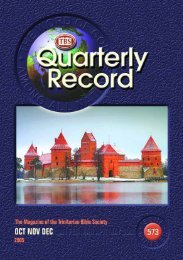
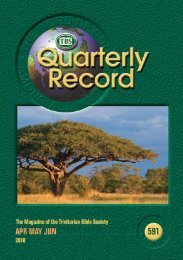
![The Love of the Truth [pdf] - Trinitarian Bible Society](https://img.yumpu.com/49788277/1/184x260/the-love-of-the-truth-pdf-trinitarian-bible-society.jpg?quality=85)
![Bible Word List and Reading Plan [pdf] - Trinitarian Bible Society](https://img.yumpu.com/46882563/1/177x260/bible-word-list-and-reading-plan-pdf-trinitarian-bible-society.jpg?quality=85)
![Click to Download Document [pdf] - Trinitarian Bible Society](https://img.yumpu.com/44904205/1/184x260/click-to-download-document-pdf-trinitarian-bible-society.jpg?quality=85)
![Download Document [pdf] - Trinitarian Bible Society](https://img.yumpu.com/44584740/1/184x260/download-document-pdf-trinitarian-bible-society.jpg?quality=85)
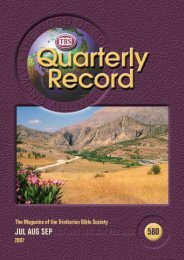
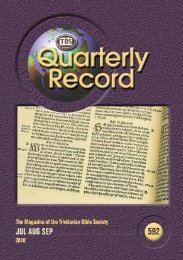
![Download Document [pdf] - Trinitarian Bible Society](https://img.yumpu.com/41007786/1/184x260/download-document-pdf-trinitarian-bible-society.jpg?quality=85)
![Click to Download Document [pdf] - Trinitarian Bible Society](https://img.yumpu.com/40894484/1/188x260/click-to-download-document-pdf-trinitarian-bible-society.jpg?quality=85)

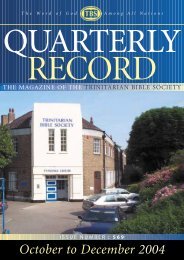
![Download Document [pdf] - Trinitarian Bible Society](https://img.yumpu.com/39425868/1/184x260/download-document-pdf-trinitarian-bible-society.jpg?quality=85)
![Download Document [pdf] - Trinitarian Bible Society](https://img.yumpu.com/39425821/1/184x260/download-document-pdf-trinitarian-bible-society.jpg?quality=85)